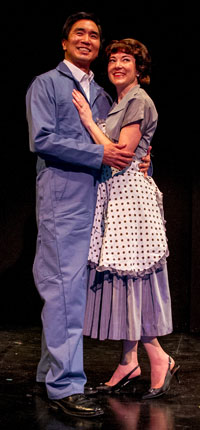Happiness, Defined.

One of the joys of being a dramaturg is the simple task of discussing the core of whatever script you happen to be working on with anyone and everyone who is willing to engage you in conversation. A few weeks ago I had the privilege of talking with our teaching artist for Maple and Vine, Tim West, while he presented his lesson plans to me as part of our Engaging the Stage workshop series. As a fellow passionate history buff and seasoned theatre artist, he and I delighted in geeking out over the many social issues threaded throughout the script.
In many ways, Maple and Vine is a dramaturg’s dream. It is rich in historical content, touching on everything from the most popular car model in 1955 to gender roles and social attitudes towards various minority groups. I got to look up the most popular ring tone in 2011, what Sanka was (or is, given that it is still currently sold in stores), and when spray paint was invented. I had to research the history of the LGBT rights movement and post-WWII attitudes towards Japanese-Americans. I learned that the year Rosa Parks refused to give her seat up to a white passenger on a bus in Montgomery, Alabama was the same year the McDonalds Corporation was founded, two dogs slurped a spaghetti noodle and ended up smooching, and the happiest place on earth opened for business.
Now as much as I enjoyed this work, deep down I knew… that’s not what this play is about. Not REALLY. It’s all essential information for making sense of the world in which this story takes place, sure. And one of the key functions of a dramaturg is ensuring the accuracy and dependability of the world in which the characters exist. But is the play about glamorizing the role of the 1950’s housewife over the 21st century powerhouse corporate woman? Is it about the wrongful treatment of Japanese-Americans during and after WWII, or the struggles of being a homosexual man during a time when loving someone of the same sex was widely considered a psychological disease? No. At least not in my opinion.
What is happiness and how do you define it? What would you sacrifice for happiness? What does it mean to live life authentically? These are the questions at the heart of Jordan Harrison’s thought-provoking play. Maple and Vine strategically presents the downfalls of 21st century living right alongside the positives of life in 1955, forcing us to question whether or not we really are happier in this age of progressiveness and convenience. And as our director, Igor Goldin, states in his program notes, “Everyone will have their own opinion which will be informed by their own histories, but with every answer will come a contradiction… As in life, nothing is black and white. Life is messy and untidy. There are no easy answers, nor does Mr. Harrison try to create any. He just presents the hypothetical and leaves the rest for us to debate.”
So won’t you join us on Sunday, February 9th after the 7:00pm performance of Maple and Vine for what is sure to be an engaging talkback on the matter of happiness? We are pleased to welcome back Dr. Edith Frampton, professor of English and Comparative Literature at San Diego State University. Joining her in leading the talk will be SDSU colleague Dr. Peter Herman. You can purchase tickets here. See you there!